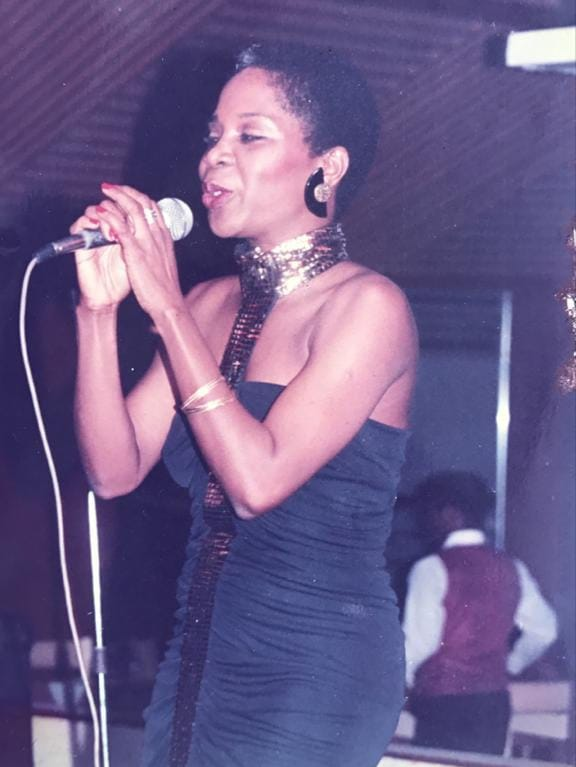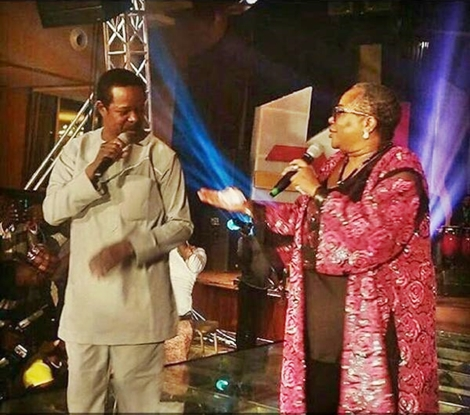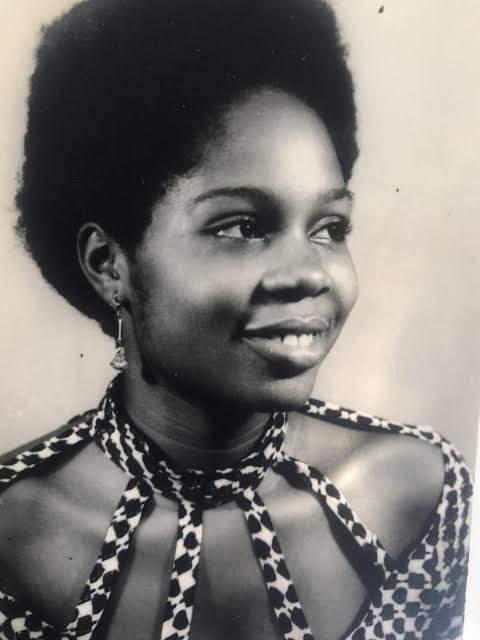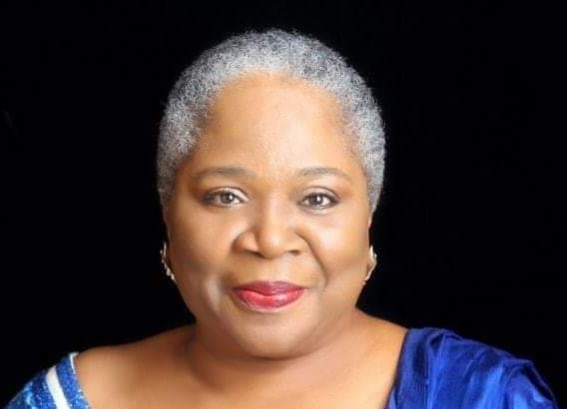Onyeka Onwenu, the ace singer whose soulful and powerful lyrics often conveyed hope and positivity and even earned her global praises and the nickname ‘the elegant stallion’, passed away on Tuesday at 72.
Onwenu succumbed to the cold hands of death at the Reddington Hospital in Lagos. The singer was said to have slumped after her performance at the 80th birthday party of Stella Okoli, the founder of Emzor pharmaceutical manufacturing company.
The songstress was born in Obosi, Anambra state, on January 31, 1952. She hailed from Arondizuogu, a small town in Ideato North LGA of Imo state but was raised in Port Harcourt, Rivers.
Onyeka was the youngest daughter of Nigerian educationist and politician Dickson Onwenu, who died in an accident in 1956 when she was four years old. The singer and her four siblings were raised by Hope Onwenu, their widowed mother. Hope lost her husband at age 36.

In the 70s, Onwenu attended Wellesley College, Massachusetts where she obtained a BA in International Relations and Communication. She also owned an MA in Media Studies from The New School for Social Research in New York, United States.
She worked for the United Nations as a tour guide and in 1980, she returned to Nigeria to complete her National Youth Service Corps (NYSC). She was a reporter and presenter with the Nigerian Television Authority (NTA) in Lagos and at some point hosted the shows ‘Contact’ (1988) and ‘Who’s On?’ (1993) both on the network.
In 1984, she wrote and presented the internationally acclaimed BBC/NTA documentary ‘Nigeria: A Squandering of Riches’. Her piece was turned into a film about corruption in Nigeria, as well as the intractable Niger Delta agitation for resource control and campaign against environmental degradation in the oil-rich region of Nigeria.
ONWENU’S CAREER IN MUSIC, FILM AND POLITICS
Onwenu ventured into the music industry in 1981. She released a pop album titled ‘For The Love Of You’ and later her sophomore album ‘Endless Life’, produced by the late Sonny Okosun — under the EMI record label.
The singer also released additional projects such as ‘In The Morning Light’, ‘Dancing In The Sun’, and her self-titled album ‘Onyeka!’. In 1986, she delivered her widely-loved song ‘One Love’.
In a 2012 interview, the singer revealed that she did not single-handedly write ‘One Love. “It was written by Sean Paul Monique who is a renowned songwriter and producer. They were producing my album at that time and having listened to the songs I wrote, he now wrote something patterned exclusively for me and I added mine to it,” she said.
Another one of her popular songs ‘You and I’ was re-recorded for the 2001 film ‘Conspiracy’ starring actor Nkem Owoh and herself. Onwenu’s other notable works include ‘’Iyogogo’, ‘Falling in Love’, ‘Odenigbo’, ‘Ekwe’, ‘Alleluya’, ‘Madawolohun’, and ‘Wait For Me’ featuring Sunny Ade.
The secular singer released four albums before switching to gospel music in the 1990s. In 2013, she served as one of the judges on the music TV show X Factor Nigeria.
In 2000, Onwenu protested against her former employer NTA over their alleged refusal to pay royalties on her songs. She alleged that NTA 2 Channel 5 used ‘Iyogogo’ in station idents without permission. She embarked on a hunger strike outside the station’s premises after she was blacklisted from transmission. The protest was called off after six days when Onwenu and NTA came to an arrangement regarding her royalties.
In addition to music, Onwenu had a successful acting career. Her first major movie role was in Zik Zulu Okafor’s ‘Nightmare’.
In 2006, she won the Africa Movie Academy Award for ‘Best Actress in a Supporting Role’ for her performance in ‘Widow’s Cot’. That same year, she was nominated for the Africa Movie Academy Award for ‘Best Actress in a Leading Role’ for her work in the movie ‘Rising Moon’.
In a decades-long career, she featured in hundreds of Nigerian movies such as ‘Chain Reaction’, ‘The Tyrant’, ‘Different World’, and ‘Omalinze’. More recently, Onwenu appeared in high-profile films such as ‘Half of a Yellow Sun’ with Chiwetel Ejiofor and Thandiwe Newton, Genevieve Nnaji’s ‘Lion Heart’, as well as ‘Muna’ alongside Adesuwa Etomi and rapper Falz.
Before her demise, Onwenu was a member of the People’s Democratic Party (PDP). She was the former chairperson of Imo state council for arts and culture. In 2013, former President Goodluck Jonathan appointed Onwenu as the executive director/CEO of the National Centre for Women Development.
She was also awarded national honours by the federal government in 2003 and 2011.
ONWENU’S ‘REGRET AS CELEBRITY’
In a 2019 interview, Onyeka revealed she nearly quit her music career due to piracy and copyright issues in Nigeria. She also tackled the then federal government for allegedly not doing enough to protect the copyright of artistes.
“I wanted to quit. How can you belong to a profession where you worked and worked and some people sat somewhere and reaped from your sweat? We sacrificed a lot as musicians and our works were pirated,” she said.
“Musicians deserve to be protected but that is not what is happening. We are not there yet. It is frustrating, the administration of copyright in Nigeria. Even at the moment, nothing is moving in the right direction. I wonder why the government is not doing anything to protect the copyright of artistes.
“… people are making money off someone’s work. I am in court with an agency that took my music and put it on the internet without my permission; making money and refusing to account. That is why I said, if I don’t do it for me, let me do it for the younger ones because many of them are unaware of their rights.”
OWENU’S LOVE FOR MARKET WOMEN
Onwenu was multitalented; a singer, songwriter, actress, human rights and social activist, journalist, and politician. But in a 2019 interview, the singer said she would have loved to be a market woman if she was not famous.
She also expressed admiration for market women, saying they “hold up a large sector of the country’s economy”.
“I have been asked that question in the past. I have great admiration for market women. The incredible thing that we don’t know is that they are holding up a large sector of the economy of this country. These women that sell tomatoes, pepper, onions; that is how they raise their children,” she said.
“That is how they train their children up to university level. That is how they hold their families together. I have a great admiration for them. So I probably would have been somewhere buying and selling like every other woman who is trying to survive. If I didn’t have education, it would still have been the same thing. I can buy and sell at all levels, considerably.”
ONWENU’S ‘TOXIC’ MARRIAGE TO A YORUBA MUSLIM
In 2020, Onwenu, who had always kept her intimate life private, revealed that she married a Yoruba Muslim man in 1984. In her autobiography titled ‘My Father’s Daughter’, the movie star said the union brought about the birth of her two sons — Tijani and Abraham.
Onyeka revealed that she split from her husband because the union was “toxic” and it left her “constantly depressed”. The singer said she never wanted her marriage to end but if she had stayed, it would have led to her untimely death.
“Unless it happens to you, you really don’t understand the sacrifices that women make. It’s about the love thing, it’s about the children as well. We want to preserve a home where there is a father and there is a unit,” Onwenu had said.

“But, if it’s going to take your life, get out fast, run! Because your children without you will suffer more. There were years where I was constantly depressed and my children noticed.
“I made a decision to fight for my happiness, my fulfillment, my joy and not wait for my husband to take care of me as he should. So, don’t wait to be killed.”
ONWENU’S BOND WITH FELA
In a 2021 interview, Onwenu revealed that the late Afrobeat legend Fela Kuti wanted to marry her. She said the music star “fell in love” and asked her to join his long list of wives after an article she wrote helped him get out of jail during the military era.
“When he was arrested for taking money out of the country, there was a decree that you don’t take money out of the country, and this is money he had earned from the tour he previously had, and he took, I think, about 1000 something pounds,” she said.
“He was caught with it, and he was arrested. He couldn’t meet up with his concert, and they arrested and jailed him. And I came up and said, ‘No, that’s wrong’.”
In her autobiography, Onwenu continued: “… meanwhile, just days later, a certain traditional ruler was allowed into the country with 53 suitcases, allegedly stuffed with the currency. The implications were many and I made these known in an opinion piece which was published in the Vanguard newspapers.
“In hindsight, I realised that the government could have had me arrested for being so critical. It was not a tolerant regime at all. I do recall, however, that Brigadier General Idiagbon, the second-in-command, had commented that the government would accept criticism from people like Onyeka Onwenu because ‘that woman loves Nigeria’.”
Owenu also recalled how she declined Fela’s marriage proposal because she was a “possessive lover”.
“In any case, after Fela was released from prison he sent a mutual friend, the journalist Onuorah Udenwa who is now a US-based pastor, to bring me to his club,” she wrote.
“I thought that he probably wanted to thank me for speaking up for him, but that was not it. He never even mentioned the article I had written in solidarity with him. Fela wanted to marry me, and I was flattered. I reminded him of the first time we met at Falolu Street and his invitation to visit his club. I thanked him for the honour of wanting me to become his consort, but I turned him down all the same.
“While I wanted to see him, I had noticed that his Queens—the euphemism for his numerous dancer-wives—had been looking at me with scorn. They passed by often, whispering comments about me. They were downright hostile and quite obvious about it.
“I pointed this out to Fela and told him that I was a possessive lover and would not be able to cope as an appendage to his harem. Fela laughed. He seemed to enjoy the idea that the women were ‘fighting’ to keep his affection. He did not persist with the marriage proposal, however.”
The actress who faced several challenges during her lifetime said “forgiveness” was the greatest lesson she learnt from life.
ONWENU’S LAST MOMENTS
Onwenu’s sudden death sent shockwaves through the Nigerian entertainment industry and the nation as a whole. Several videos of the late singer performing some of her greatest hits a few moments before her demise also went viral on social media.
In the clips, the musician appeared to be in good health and high spirits as she took the stage, energetically singing and dancing to classics like ‘One Love’ to the delight of the guests.
‘HOW I WANT TO BE BURIED’

In an opinion piece published on TheCable on July 27, 2021, the ace singer said she preferred a private, modest, and quick farewell.
Onwenu asked her loved ones to “mourn, yes but not excessively”. She also mentioned that they “do it quickly, quietly and privately”.
“Do it quickly, quietly and privately. Celebrate me with prayers, lunch or dinner afterwards. Share some jokes about me and laugh. Mourn, yes but not excessively,” it reads in part.
“Make merriment and then go about your business. If my friends want to celebrate me, they should do so while I am alive so that I can enjoy it with them, not when I am gone and have no idea. That is me Onyeka Onwenu.”
Although the cause of her death remains unknown, Onwenu ultimately lived a life of impact and died doing one of the many things she loved to do. Singing.
Copyright 2025 TheCable. All rights reserved. This material, and other digital content on this website, may not be reproduced, published, broadcast, rewritten or redistributed in whole or in part without prior express written permission from TheCable.
Follow us on twitter @Thecablestyle

